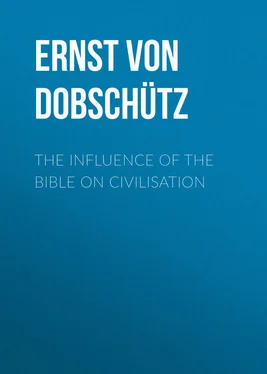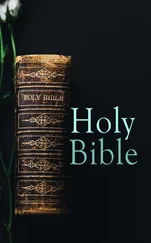Ernst Dobschütz - The Influence of the Bible on Civilisation
Здесь есть возможность читать онлайн «Ernst Dobschütz - The Influence of the Bible on Civilisation» — ознакомительный отрывок электронной книги совершенно бесплатно, а после прочтения отрывка купить полную версию. В некоторых случаях можно слушать аудио, скачать через торрент в формате fb2 и присутствует краткое содержание. Жанр: foreign_religion, foreign_antique, foreign_prose, на английском языке. Описание произведения, (предисловие) а так же отзывы посетителей доступны на портале библиотеки ЛибКат.
- Название:The Influence of the Bible on Civilisation
- Автор:
- Жанр:
- Год:неизвестен
- ISBN:нет данных
- Рейтинг книги:3 / 5. Голосов: 1
-
Избранное:Добавить в избранное
- Отзывы:
-
Ваша оценка:
- 60
- 1
- 2
- 3
- 4
- 5
The Influence of the Bible on Civilisation: краткое содержание, описание и аннотация
Предлагаем к чтению аннотацию, описание, краткое содержание или предисловие (зависит от того, что написал сам автор книги «The Influence of the Bible on Civilisation»). Если вы не нашли необходимую информацию о книге — напишите в комментариях, мы постараемся отыскать её.
The Influence of the Bible on Civilisation — читать онлайн ознакомительный отрывок
Ниже представлен текст книги, разбитый по страницам. Система сохранения места последней прочитанной страницы, позволяет с удобством читать онлайн бесплатно книгу «The Influence of the Bible on Civilisation», без необходимости каждый раз заново искать на чём Вы остановились. Поставьте закладку, и сможете в любой момент перейти на страницу, на которой закончили чтение.
Интервал:
Закладка:
From "Die Wiener Genesis." F. Tempsky, Vienna.
Justinian, of course, codifies the Roman law, but his Novellæ, the laws issued by himself, show the new spirit of a legislation ruled by the Bible. He sometimes refers directly to the Bible as authority. Still more is this spirit prevalent in some provincial codes. One of these says that everything has to be judged according to the ancient and to the modern law, i. e., the law of Moses, which antedates the laws of all other nations, and the law of Christ, as it is contained in the laws of the emperors Constantine, Theodosius, and Leo. Lawyers of this period indulge in comparisons between the Roman law and the law of Moses.
The Roman empire was Latin in some respects, Greek in others. Latin was the official language of the court, of the law, of the army. But the population spoke mostly Greek, though from the third century on large parts used their native language, Syriac and Coptic, as well. The Bible had been translated into these languages during the former period. Now the general political situation brings the empire into contact with the Goths in the North, with Armenians and Georgians in the East, with Libyans and Ethiopians in the South. As soon as the empire gains any influence among these neighbouring peoples, the Christian mission tries to get hold of them and we see the Bible translated into these languages, which hitherto have had no writing. The Bible marks for these peoples the beginning of a national literature. Their alphabets were made up from the Greek, thus showing that the reading of the Bible with these nations began in connection with their intercourse with the Roman empire.
The Bible ruled even the Greek language of this empire. There are many changes in the later Greek which are surely due to familiarity with the Bible. Words previously unknown in Greek or used in a different sense became quite familiar; everybody knows what is the meaning of Beelzebub, Messiah, Paradise, Satan, and that an angel is not a mere messenger, but is a messenger from God, a spiritual being, and that the word demon always means an unclean spirit.
Moreover, the Bible influenced the style of the writers, especially of the great preachers. One may distinguish three forms of influence in this department: artificial imitation; naïve use of Biblical names and phrases (what is usually called in Germany the language of Canaan); and, lastly, the unconscious influence which the style of any book exerts upon a careful reader. I do not think that there are many instances of artificial imitation in this period. Sometimes a preacher skilfully composed his whole sermon by adding Biblical quotation to quotation; asked to preach a sermon on a saint's day, he did nothing else than comment upon the saint's life in Biblical phrases. The second type of influence is very common; the present emperor is usually spoken of as the new David; the story of a war is always told as if David were fighting the Philistines; each heretic is entitled to be called the new Judas Iscariot who betrays his Lord. The most famous example of this kind is the sermon attributed to Chrysostom after his first return to Constantinople, when he had fled from the wrath of the empress: "Again Herodias is furious, again she flurries, again she dances, again she desires the Baptist's head to be cut off by Herod." The preacher's own Christian name, of course, was John, and the empress was trying to get rid of him for political reasons.
The most important influence, however, is the unconscious influence simply from the use of the Bible. The great power of Chrysostom's sermons was partly due to his eminent rhetorical talent and training. He knew how to gain his hearers' attention; yet for the greater part his thorough acquaintance with the Bible seems to be responsible. Reading the sermons of those great Greek Christian orators of the fourth century, we are often struck by the embedded quotations from the Bible. In the midst of this fluent Greek there is something quite different, something stern, something austere, something dignified and solemn, which immediately appeals to the hearer. As a matter of fact, the preachers themselves, proud as they were of their classical training, had rather the opposite impression; they apologise for introducing barbarous language. Chrysostom insists, in many a sermon, on the idea that the apostles were fishermen, unskilled in literary style, and that it is one of the proofs of inspiration that those men could write at all. He evidently is not aware of the fact, clear to us, that it is just the vigour and strength of Biblical language which gave to his own sermons their magnificent effect. He was filled with Biblical phraseology as was no other preacher of his time. He himself did not realise it, nor did, I presume, the greater part of his congregation, yet it was this which so impressed them. If only the modern editors would note all the Biblical allusions in his works! Yet they are hardly able even to recognise them. We find preachers noted for their brilliancy in extemporaneous speaking, and usually the remark is added, it was because the speaker knew the Scriptures by heart.
In this way the people became accustomed to Biblical phraseology, and we do not wonder that at last the colloquial Greek also was influenced by the Bible. We can trace its influence even in the romances.
The Bible ruled the home and the daily life; people had their furniture decorated with Biblical symbols; lamps showed Noah's ark or Jonah's whale, Jesus with his disciples in a ship or Jesus treading upon the lion and adder, the serpent and dragon (according to Psalm 91). At the Strassburg Museum there is a beautiful engraved glass cup made probably in a Roman manufactory in Cologne. On one side is engraved Abraham sacrificing Isaac, on the other side Moses striking water from the rock. Rich people wore sumptuous garments embroidered with representations of Biblical scenes. The preachers complain that these people wear the miracles of Christ on their coats instead of taking them to their heart and conscience.
The great officials of the empire used to give to their friends ivory tablets commemorating their honours. In former times they had represented on them the emperor, the empress, or their own portraits, and scenes from the circus; now they chose Biblical subjects. People liked to have long rolls exhibiting the wars and triumphs of an emperor in a continuous series of drawings. Two gigantic rolls of this kind may still be seen at Rome; I mean the columns of Trajan and of Marcus Aurelius. Christian art produced rolls of the same kind, exhibiting the story of Joshua's battles (Plate VI). Senators and noble ladies vied with each other in arranging the history of the Bible and especially the life of Jesus in the form of poems, each word of which was taken either from Homer or from Vergil. It is a wonderful mixture of Bible and classical culture.
Joshua is sending from Jericho (at the left, walls tumbling down) to Ai two men to spy out the land, Joshua 7: 2. The towns are represented by edifices as well as by allegorical figures (Tyche of the City).
From "Vatikanische Miniaturen," by St. Beissel. Copyright by B. Herder, Freiburg.
The Bible rules not only the public and the private life, but also the church and its organisations. At the beginning the Christians were afraid of comparing the Old Testament rites with the ecclesiastical institutions. The Law of the Old Testament belonged to an earlier form of religion; it was abolished by the New Testament. Christ, according to Saint Paul, was the end of the Law. But by and by the Old and the New Testament were brought nearer together. An author of the first century remarks that God by his commandments in the Old Testament has shown himself to be a lover of order, therefore in the Christian congregation, too, order ought to rule. He does not call the Christian communion a sacrifice, the Christian minister a priest; but his parallelism comes very near to this, and a century later the step is taken. It becomes usual to speak of bishop, elders, and deacons as high-priest, priests, and Levites. Later on, even the minor degrees were taken back to Biblical models: the subdeacon, lector, exorcist, acolyte, janitor were found represented in the Old Testament. The clergy formed a separate class as distinct from other people as the tribe of Levi was among the tribes of Israel. It was upon the authority of the Old Testament that they claimed rights and prerogatives to be given and guaranteed by the empire. The monks found their models in Elijah and Elisha; common life was represented by the apostles; penitents were Job, David, and the people of Nineveh; widows (as ecclesiastical functionaries) had their models in Naomi, Hannah, Tabitha, etc. The church was the tabernacle of Moses and the temple of Solomon, and each detail in the description of these Biblical buildings was made to agree with a feature in the Christian church by means of allegorical interpretation. The feasts of the church correspond to the feasts of the Old Testament; Easter is usually called Passover, and Whitsuntide Pentecost. At a rather early date a festival of the dedication of the individual church was introduced to correspond with the festival of the dedication of the temple. As the Jews kept two days in the week for fasting, so did the Christians, choosing Wednesday and Friday instead of Monday and Thursday; and in doing so they remembered that it was on a Wednesday that Jesus was betrayed by Judas and on a Friday that he died on the cross. Even the usual hours for prayers were based on Old Testament authority; David, saying in Psalm 141: 2 "The lifting up of my hands as the evening sacrifice," means vespers, while in the 131st Psalm he is speaking of compline, in the 63d of matins. The vigil was observed as well as commanded by Christ himself (Luke 6: 12 and 12: 37). The whole liturgy was explained as being in every detail a representation of the life of Christ. The sacraments, too, were prefigured in the Old Testament. This symbolism is very old and very commonly used; it has influenced Christian art. We see Noah's ark as a symbol of baptism ( cf. I Peter 3: 20); Abel's sacrifice, and Melchisedek offering bread and wine to Abraham, as symbols of the holy eucharist. Abraham entertaining at his home the three angels reveals the holy Trinity. All this is represented in splendid mosaics on the walls of the churches, as for instance in San Vitale at Ravenna.
Читать дальшеИнтервал:
Закладка:
Похожие книги на «The Influence of the Bible on Civilisation»
Представляем Вашему вниманию похожие книги на «The Influence of the Bible on Civilisation» списком для выбора. Мы отобрали схожую по названию и смыслу литературу в надежде предоставить читателям больше вариантов отыскать новые, интересные, ещё непрочитанные произведения.
Обсуждение, отзывы о книге «The Influence of the Bible on Civilisation» и просто собственные мнения читателей. Оставьте ваши комментарии, напишите, что Вы думаете о произведении, его смысле или главных героях. Укажите что конкретно понравилось, а что нет, и почему Вы так считаете.












